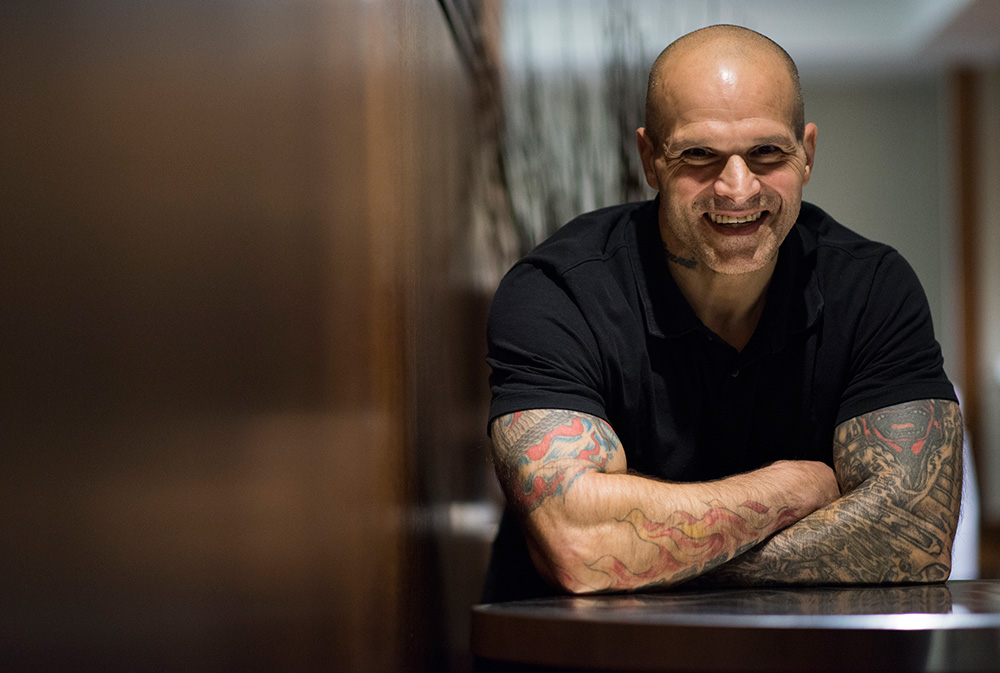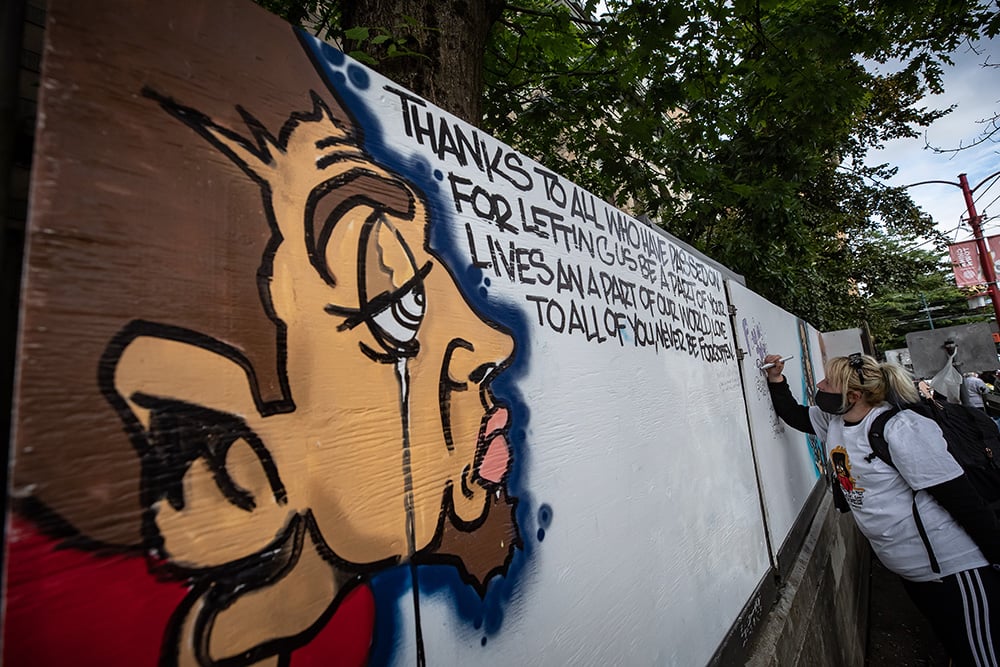Vancouver’s council made history this week by asking the federal government for an exemption from Canadian drug laws to decriminalize possession of drugs for personal use.
Council voted on the motion the same day the BC Coroners Service reported 1,386 people have died so far this year of an overdose, with deaths increasing as a result of the COVID-19 pandemic.
So what happens now?
The day after the vote, Mayor Kennedy Stewart met with Dr. Patricia Daly, the chief medical health officer for Vancouver Coastal Health, and Adam Palmer, Vancouver’s police chief.
In both meetings, the mayor spoke about “next steps on decriminalization and how we would begin to gather critical local input into our request for the federal government,” Alvin Singh, the mayor’s director of communications*, told The Tyee via email.
When the motion was being discussed Wednesday, people who use or have used drugs told council over and over again “nothing for us without us,” emphasizing that people who use drugs need to be part of the conversation.
“This input is critical both now, before we send the official request, and afterwards if we get a positive answer,” Singh said.
Stewart plans to “touch base” with Patty Hajdu, the federal health minister, sometime in the next few days.
But getting federal approval could be a tough sell. In September, Prime Minister Justin Trudeau said he doesn’t support decriminalization as a solution to the overdose crisis. Hajdu took a similar position earlier this year.
The city will ask the ministers of health and public safety and the attorney general for an exemption to the Controlled Drugs and Substances Act’s provisions on possession of drugs for personal use within the city.
Section 56 of the act grants the health minister the power to issue an exemption from any part of the legislation “for a medical or scientific purpose or is otherwise in the public interest.”
It is the same mechanism the city used to establish North America’s first supervised injection site in 2003 and, more recently, to allow health-care providers to prescribe alternatives to street drugs as a part of safer supply measures.
Guy Felicella spent 30 years in the Downtown Eastside addicted to heroin before entering recovery in 2013. He’s now a drug policy advocate and a peer clinical advisor for the BC Centre on Substance Use.
He said decriminalization has “been pushed for decades, but to actually have some momentum — it’s a powerful moment in Canadian history.”
For decades, Canadian society has been moving towards treating drug use as a health issue instead of a criminal justice issue. But despite that shift, people who use drugs are still being charged with offences like possession or possession for the purposes of trafficking — even for relatively small amounts of drugs — and serving jail time.
The Vancouver Police Department says officers now rarely charge people for possession, and the force’s chief, Adam Palmer, has publicly supported decriminalization. However, people who use drugs say police continue to regularly confiscate illicit substances.
Felicella said it all has to stop. As Vancouver moves forward on getting an exemption, Felicella warned of “criminalization by another process,” such as fines, alternative charges like possession for the purposes of trafficking, or drug confiscation.
“Maybe they don’t arrest people for simple possession 97 per cent of the time, but they sure take their drugs,” Felicella said. “They’ve been doing this for decades.”
The Vancouver Police Department says it is not “general practice to seize drugs from people using them,” but officers must confiscate drugs if they find them during a search for an investigation.
However, people who use drugs and advocates who work with drug users say police constantly take drugs away from people.
To replace the drugs, people are making risky choices, like sex work or committing petty crimes like shoplifting or car break-ins. Criminalizing people also pushes drug use into the shadows, Felicella said, and with a poisoned drug supply, that’s putting people’s lives at risk.
“It’s so freaking stressful when you’re down there and you have cops following you around,” Felicella said. “It’s just a mental toll, physically, emotionally and mentally.”
An option known as drug court — where people charged with drug-related crimes can avoid jail time by entering a drug treatment program — also needs to stop, Felicella said.
“Having a judge sentence you to go to drug court is really putting treatment in the [category] of punishment,” Felicella said. “When that fails, and the treatment fails as well, it sure doesn’t make you want to go back the second time to try it again.”
In opposing decriminalization, Trudeau has said it’s not “a silver bullet” and his government is prioritizing other interventions, like expanding safe supply — prescribing drugs to people to replace tainted illicit drugs.

Felicella said decriminalization needs to go hand in hand with more access to safe supply and treatment options for people who want to stop using drugs.
Currently in B.C., there’s a six- to eight-week wait to get into a treatment program if you or your family can’t afford to pay tens of thousands of dollars, Felicella said.
He said his own journey to recovery only happened after he was diagnosed with attention deficit hyperactivity disorder, or ADHD, and was able to get therapy to deal with trauma. Felicella still goes to a therapist regularly, but he said it’s not an option available to people who can’t pay out of pocket.
Karen Ward, a drug policy advocate who works with the City of Vancouver, told council that decriminalizing drug possession could also help break down barriers that still exist with prescribing safe supply.
“Doctors... are going to feel a little bit more able to prescribe [safe supply],” Ward said. “There’s hesitation there, despite all the power they have in society — they’re hesitant to be associated with drug users.”
Felicella said safe supply takes people out of the constant grind of having to hustle to find the money to buy illicit drugs.
The relationship between the police and Downtown Eastside residents is as bad as it’s ever been, said Felicella. He called on police to “stand down” in the neighbourhood, where many residents use illicit drugs regularly while also living in poverty and with chronic health conditions.
“People still feel the same fear of the police,” he said. “Police show up in the alleys and people are like, ‘Oh, my God. What’s gonna happen?’”
The VPD says it devotes special resources to keep people safe in the neighbourhood, connect homeless people with housing and provide support to sex workers.
“There continue to be calls for service from citizens and businesses for police help for violent crime and property crime,” spokesperson Simi Heer wrote to The Tyee in an email. “We expect officers to deal with property crime, street disorder and violence.”
While the department supports decriminalization and chief Palmer wrote a message of support for the mayor’s motion, Felicella said he is at times confused by the force’s decisions.
“One minute they’re creating a task force to make sure people are safe, and then the next thing they’re harassing people on the street and moving them along. And then the next thing, they wanted to decriminalize drugs,” he said.
“Hopefully, if this passes at a federal level, we can change the direction for many people.”
* Story updated on Nov. 30 at 3:45 p.m. to correct Alvin Singh’s title. He is director of communications for Vancouver's mayor, not chief of staff. ![]()
Read more: Health, Rights + Justice, Municipal Politics
















Tyee Commenting Guidelines
Comments that violate guidelines risk being deleted, and violations may result in a temporary or permanent user ban. Maintain the spirit of good conversation to stay in the discussion.
*Please note The Tyee is not a forum for spreading misinformation about COVID-19, denying its existence or minimizing its risk to public health.
Do:
Do not: